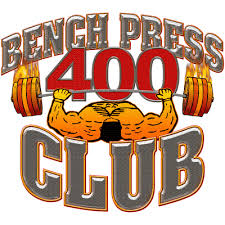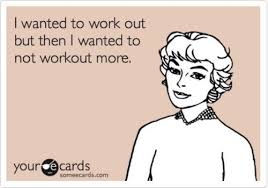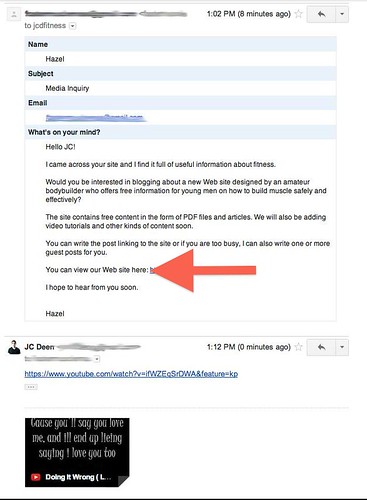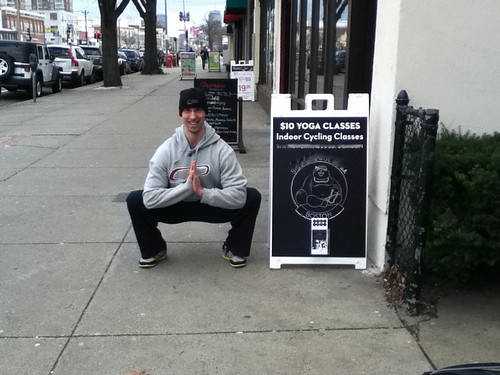Today’s guest post is brought to you by Tim Henriques. Tim’s someone whom I’ve followed a lot on sites like T-Nation because I admire his no-frills, no BS approach to training. He’s also someone I respect a ton because not only is he a phenomenal coach, but he’s also deadlifted 700 lbs at a bodyweight of 198 lbs.
Ie: I hate him.
He knows a thing or two when it comes to powerlifting, and his new book, All About Powerlifting, sets the benchmark for learning everything and anything about the sport.
It’s a beautiful book, coming in at 485 pages, which details everything from dissecting each lift (squat, bench, deadlift) and how to master each one, including tips on technique and troubleshooting strategies, to all the nitty gritty stuff that people never think about like rules and regulations of all the different federations and how to go about determining your opening lifts. And much, much more.
The title doesn’t lie: It’s ALL About Powerlifting.
Tim was kind enough to send me an advance copy and I’ve really enjoyed reading it because it’s straightforward, loaded with information, and doesn’t make my head hurt with big words. And there’s lots of pictures and stuff.
He was also kind enough to write this amazing post today. So I hope you enjoy it!
5 Life Lessons Learned From Powerlifting
I have been competing in powerlifting for over two decades and I love the sport. I have learned a tremendous amount, both in and out of the gym, thanks to powerlifting. When Tony suggested I share some life lessons I thought that was an excellent idea. Here are 5 key life lessons I have learned from the sport of powerlifting.
1. Patience
My wife might tell you I still haven’t completely mastered this, but I definitely have more patience now than when I was younger.
Some of that may simply be due to age, but I believe a lot of it has to do with lifting. If  you have spent any time in the iron game you know the gains can ultimately come slow. I benched over 300 (305) in a competition when I was 20 and I was sure 400 was right around the corner. If you would have told me I wouldn’t bench 400 by the time I was 30 I would have laughed at you, but sure enough 30 came and I still had not benched over 350!
you have spent any time in the iron game you know the gains can ultimately come slow. I benched over 300 (305) in a competition when I was 20 and I was sure 400 was right around the corner. If you would have told me I wouldn’t bench 400 by the time I was 30 I would have laughed at you, but sure enough 30 came and I still had not benched over 350!
At that point I thought I may never hit 400, but I didn’t give up, I tried new training programs and kept plugging away and 400 finally came. It certainly wasn’t astronomical progress and a 400 lb bench isn’t earth shattering in powerlifting terms anyway, but it meant a lot to me because it was such a long time coming.
Most good things in life take patience. Relationships, kids, important work projects – all require patience and in this day and age of quick fixes and instant gratification I think building patience is important.
2. Focus on Results
One of my favorite quotes is “you can’t argue with results”. Powerlifting forces you to focus on results.
You can design any sort of fancy program you want on paper but when it is time to step up on the platform you can’t fake your way to progress. You will immediately know if what you did worked or not. Being driven toward results has had another benefit. Powerlifting seems to have the ability to make one immune to fads, which are ever present in the fitness industry.
 When you are focused on finding those hard earned results, you will almost immediately realize that bosu balls, bodyblades, shake weights and other gimmicks are just that – tools may have a very slight benefit in certain circumstances but ultimately they are a way for us to deceive ourselves into thinking we are working hard, when in fact we are not.
When you are focused on finding those hard earned results, you will almost immediately realize that bosu balls, bodyblades, shake weights and other gimmicks are just that – tools may have a very slight benefit in certain circumstances but ultimately they are a way for us to deceive ourselves into thinking we are working hard, when in fact we are not.
Try to convince a powerlifter that this or that new thing will instantly make one bigger and stronger and you’ll find it a short conversion. Focusing on results also helps one from becoming stuck in a certain philosophy – this person follows High Intensity Training, that person does kettlebells, this guy is a Westside guy, that lady just does 5/3/1. They all have their merits and they all likely will not be ideal to follow for the rest of your life.
Let results – both yours and your competitors – guide you and ground you. All theories, no matter how eloquently worded, must at some point be tested and ultimately judged on their results.
3. Have a Plan
The difference between training and exercising is when you are training you have a plan – a map – to get somewhere.

When you are exercising you are just working out, there is no master plan – no end destination – at work.
If you want to be successful in powerlifting, you need to have a plan, and goals will help you create that plan. There are all sorts of goals, but powerlifting teaches you to zero in on the most important goals.
And what goals are those you ask? Good question.
It is the daily goals that really make all the difference. Most people walking around have some version of a long term or ultimate goal in their head, it could be related to fitness or it could be something else. I want to complete a Tough Mudder, I want to deadlift triple bodyweight, I want to write a book, I want to open up a business. Long term goals are great to work toward, but sometimes the person’s starting point is so far away from that end goal they don’t know what to do or where to begin.
Powerlifting teaches you it is the daily goals that count. You want to deadlift triple bodyweight? Great, put your time in in the gym and work on that. It doesn’t matter where you start, but it does matter how hard you work, how consistent you are, and what you do each day – day after day.
Regularly completing your daily goals (which should be well within your reach) is what you gets you to that long term goal. Sitting around and dreaming about the long term goal actually does very little. Direct your energy toward your daily goals, be consistent, show up, don’t get distracted, and you might be amazed at what happens.
4. Create a Positive Environment
If you train hard you quickly realize the difference between training in Planet Fitness and training in a hardcore gym that promotes hard work.
It is invigorating to be surrounded by people working toward a similar goal. You see them working hard, they see you working hard, it is motivating for everyone involved and everyone gets better.
Transfer this over to the rest of your life.
If you want to surround yourself with positive workout partners, also surround yourself with positive people in your social and your business life. Go out with positive people, hire people you like to be around that value hard work, and move to distance yourself from those that don’t.
By positive I don’t just mean somebody that is happy and flighty, I mean someone that creates positive energy.
Trust your gut on this. Do you enjoy being around that person? Do good things tend to happen when you are around that person? Are you looking forward to being around that person more? If the answer is yes or no, act on it either way. Don’t stay connected to people that don’t believe in you and don’t let negative people drain your energy, surround yourself with good people and good things will happen.
5. Life is Better With Other People
My natural tendency is to be a bit of an introvert. I also tend to romanticize the idea of me against the world. I think a lot of lifters may be similar.

But as I have gotten older I have moved away from both of those mind-states. It is okay to be an introvert, but I also think it is important to realize that life is simply better with other people around (assuming you can find the type of people I was referring to in point 4).
Think about the last time you had a tremendous amount of fun – were you alone? When do you laugh and smile the most? I doubt it is when you are by yourself. When I see something beautiful or have an accomplishment, the first thing I want to do is share that with somebody else.
Some of my fondest memories are hanging out with my workout partners in the gym.
Many of the people I have met in the gym have gone on to become my closest friends. My best man at my wedding and best friend to this day was my collegiate workout partner.
I created a powerlifting team in part because I wanted to create a positive environment and because I wanted people around me when I workout. Certainly some part of that is selfish, but another part is not, because those same people often do better, excel, and enjoy life more when they are around other people.

In my opinion the goal is not to live in solitude in a cave somewhere (although there can be moments when that has its appeal); life is simply better when there are other people to share it with. These might be your teammates, your workout partners, your significant other, your kids, your coworkers, whomever it is for you.
Cultivate those relationships and appreciate them.
Summary
I have a lot to thank the sport of powerlifting for. As a kid I grew up on Arnold and Stallone movies so I always wanted to be big and strong. Those terms are relative and one is likely never truly content in that department, but powerlifting helped me get a lot closer to those goals.
It taught me to have patience (I think my students will appreciate that), to focus on results, to have a plan (I never would have written my books without that), to create a positive environment, and realize that life is just better with other people around. I think if you embark down the road paved with iron you will discover similar and equally valuable lessons await you.
About the Author
 Tim Henriques is the Director for the National Personal Training Institute of VA/MD/DC. NPTI is a 600 hour long program for people who wish to become personal trainers. Tim is a Collegiate All American Powerlifter and he currently coaches his powerlifting team, Team Force, which won their federation’s National Championships in 2013. He regularly teaches, lectures, and writes on the topics of health and fitness. He recently released a book entitled All About Powerlifting, which has been hailed as “the new bible of powerlifting”.
Tim Henriques is the Director for the National Personal Training Institute of VA/MD/DC. NPTI is a 600 hour long program for people who wish to become personal trainers. Tim is a Collegiate All American Powerlifter and he currently coaches his powerlifting team, Team Force, which won their federation’s National Championships in 2013. He regularly teaches, lectures, and writes on the topics of health and fitness. He recently released a book entitled All About Powerlifting, which has been hailed as “the new bible of powerlifting”.









